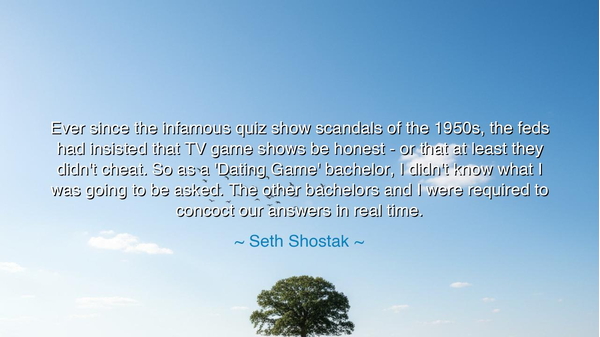
Ever since the infamous quiz show scandals of the 1950s, the feds
Ever since the infamous quiz show scandals of the 1950s, the feds had insisted that TV game shows be honest - or that at least they didn't cheat. So as a 'Dating Game' bachelor, I didn't know what I was going to be asked. The other bachelors and I were required to concoct our answers in real time.






In the annals of spectacle, a sober proverb is etched: “Ever since the infamous quiz show scandals of the 1950s, the feds insisted that TV game shows be honest—or at least that they didn’t cheat. So as a ‘Dating Game’ bachelor, I didn’t know what I would be asked. We were required to concoct our answers in real time.” Hear the double edge in this saying: first, a warning from history that play corrupted becomes betrayal; second, a charge to the performer to meet surprise with courage. The stage that once trafficked in prearranged triumphs was forced to rediscover its soul: authenticity. And so the contestant learned to breathe without a script, to greet the unknown with wit and clean hands.
The 1950s wound is not rumor but record. In those days, bright lights fell on contestants and a nation leaned forward—only to learn that some victories had been salted, some failures staged, some champions coached in the shadows. This breach was more than entertainment gone awry; it was trust defrauded. The feds, guardians of the commons, stepped in; statutes were sharpened, oaths demanded, and producers taught anew that the people’s attention is a sacrament, not a vein to be mined. Thus the stage was purged, and a new vow took root: let contest be contest.
From that vow sprang a discipline of spontaneity. On The ‘Dating Game’, the curtain between question and reply was kept clean: no whispered prompts, no secret cue cards, only the thrum of the moment. A bachelor sat beneath the sun of the audience’s gaze and waited to be asked, knowing that the next breath must carry an answer born now, not yesterday. This is not merely television craft; it is a human art—the marriage of readiness and risk, the willingness to be seen thinking, not merely performing.
To grasp the weight of this, recall the tale of a celebrated scholar who, in that earlier era, rose to fame on a rigged quiz and later confessed under oath. His fall was a national catechism: even the learned may be lured by easy laurel; even the crowd may prefer illusion to truth—until the bill comes due. The correction that followed—rules, oversight, a culture of verification—was the people’s penance and protection. In this cleared air, shows like the ‘Dating Game’ could claim a simpler, braver virtue: delight unscripted.
There is, too, a subtler wisdom in the requirement to answer in real time. It teaches that character is what remains when preparation ends. You may polish your humor, but you cannot prewrite your soul. The unscripted question reveals posture: do you listen, do you respect, can you play without wounding? Where earlier producers bent outcomes in silence, the new code bends performers toward presence. The rules forbid cheat and thereby invite grace: quick thought yoked to genuine feeling.
Let this be the lesson to apprentices of any craft—science, art, leadership, love. Honor the honest frame: clear rules, public trust, no hidden levers. Then train for the unscripted storm: study widely so that wit has roots; practice listening so that your first words are not your worst. Remember that the audience—whether millions on a broadcast or one beloved across a table—can smell the prepackaged line. They forgive falter; they do not forgive fakery.
Rites for the road: (1) Build systems that make deceit costly and integrity easy—peer review, transparent scoring, open logs. (2) Rehearse agility: put yourself where questions come without warning—mock boards, cold reads, honest Q&A—so your mind learns to land on its feet. (3) Keep a short ledger of principles you will not trade for applause. (4) When you are finally asked, answer from the living spring of the moment, not the stale cistern of rehearsal. In this way you will redeem the stage you stand upon, and your answers—like the best television after the scandals—will be a small, sturdy tribute to a public trust repaired.






AAdministratorAdministrator
Welcome, honored guests. Please leave a comment, we will respond soon